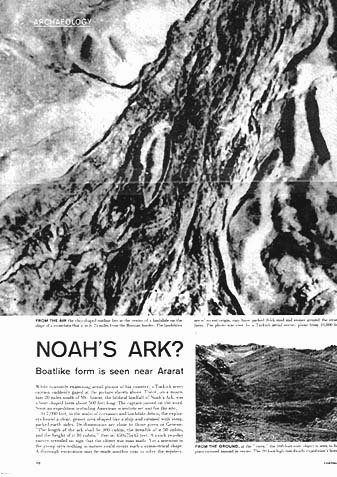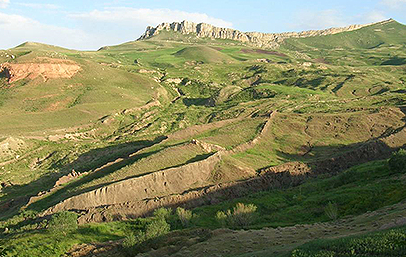

PLEASE NOTE:
This webpage is a section of a much longer profile of Ron Wyatt's claims (about Noah's Ark, Sodom and Gomorrah, the Ark of the Covenant and much more) on this Field Guide website. Click here to go to the beginning of the Overview of the Archaeological Claims of Ron Wyatt. Some sections below make reference to the book Holy Relics or Revelation by Colin and Russell Standish, Seventh Day Adventist authors who have provided extensive documentation investigating Wyatt's many claims. See the Bibliography section at the end of the Overview for details on this book.

In a Nutshell
The late amateur archaeologist Ron Wyatt claimed during his lifetime to have positively identified the remains of Noah's Ark. Since his death in 1999, supporters and promoters of his archaeological claims have continued to promote Wyatt as the "discoverer" of the "Real Noah's Ark". This webpage provides documentation and evaluation regarding these claims.

The Claims
In 1960, a sensational photo and news story made the rounds of publications, including this article in Life magazine in September.
 This aerial photo was of a spot in Turkey near the modern Mt. Ararat. It was taken
by a Turkish airforce pilot. But the possible significance of the "boat-
This aerial photo was of a spot in Turkey near the modern Mt. Ararat. It was taken
by a Turkish airforce pilot. But the possible significance of the "boat-
 Here is a close-
Here is a close-
A young man named Ron Wyatt was fascinated by these pictures and the possibility that this really was Noah's Ark.
Years later he decided to embark on an effort to prove to himself … and to the world … whether the possibility was a reality. Wyatt was not an archaeologist, and had no particular expertise or training in any scientific field that might help him evaluate the sites and objects he was later to find. He was employed as a nurse anesthetist, and could only pursue his archaeology hobby during vacation times. But this didn't prevent him from zealously pursuing his dreams.
Wyatt made his first trip to Turkey in 1977. He was convinced from his very first visit that the formation he had seen in the picture in Life magazine was, indeed, Noah's Ark. Over the next decade he worked at convincing others to accept and verify through scientific methods his own convictions about the site.
 Initial reports from the investigations seem to have been wildly enthusiastic, including
claims about "trainloads" of evidence available, particularly "deck timbers."
Initial reports from the investigations seem to have been wildly enthusiastic, including
claims about "trainloads" of evidence available, particularly "deck timbers."
But as the years went by, only a handful of items of alleged evidence from the site have ever been shown by Wyatt to the public. These included a single specimen eighteen inches long said to be "petrified wood" (and further alleged to be "laminated"), a small object said to be a fossilized metal "rivet", and some printouts of both radar scans of the site and of lab analyses done on the alleged "wood" and "rivet."
In addition, photographs and motion picture film and videotapes of the site have been provided, with unsubstantiated claims for what was being shown in the pictures. For instance, there is a picture on the Wyatt Museum website that is alleged to be of "rib timbers" of the ark. However, it appears that no samples have ever been taken for analysis to substantiate this claim. And many scientists who have viewed the picture have noted that there is no reason to conclude that the picture shows anything other than a natural geological formation.
Wyatt also claimed to have found, in a village near the site, the "home" of Noah and his wife, and their tombstones. And a number of large monoliths in the area, each with a hole near the top and some with inscriptions on them, were believed by Wyatt to be "drogue stones" for the ark … anchor weights used to help "land" the ark.
During his lifetime, up to his death in 1999, Ron Wyatt vigorously promoted his claims for the Durupinar site through articles, newsletters, books, videos, personal appearances, and ultimately a museum. [He went on to make claims of many other astounding archaeological finds including the Ark of the Covenant. For more details on these other claims, see the Overview mentioned at the top of this page.]
Wyatt's bombastic zeal and enthusiasm and aggressive promotional approach made his claims very persuasive to the general public. Hundreds of thousands of Christians … perhaps even millions … have come to accept his claims at face value. It is likely that most of these have never even heard that there is contrary evidence to those claims, and that those in the scientific community … including dedicated Christian creationists … have almost universally rejected his claims as being utterly unscientific and unsubstantiated.

The Allure
For many Christians, the thought that there might actually be solid, scientific evidence for some of the more "miraculous" claims of the Bible is very appealing. They would like to have material with which to answer the sneering questions of atheist friends, and with which perhaps to even bolster their own confidence in the Bible.
Thus the flamboyant claims of Ron Wyatt to have just the evidence they need is very gratifying. Wyatt has been able to weave a very convincing story by carefully selecting information which seems to substantiate his claims … and conveniently leaving out all the contrary evidence.
The magic of video editing and persuasive narration ensures that viewers can be swept along into accepting whatever they are told about the images on the screen. And why not … it is what they want to hear in the first place. Avid Wyatt promoter Devon Grey made this clear in his article In Defense of Ron Wyatt [see details of this article elsewhere on this Field Guide website in the section on Overview of the Supernatural Claims of Ron Wyatt] when he claimed about Wyatt:
There is more than enough evidence in his findings to convince anyone who wants to believe.

Concerns
Wyatt's claims about the Durupinar "Noah's Ark" site have been featured in videos
produced by his own organization, as well as in some commercially-
The primary "evidence" that attracts most viewers seems to be just the sheer size of the formation (it is roughly the length given in the Bible for Noah's Ark) and the odd shape, which does look like a modern "ocean liner" shape.
But that is hardly enough to establish proof of the identity. The videos rely more on speculative description of various objects found within the formation to convince the viewer that this is, indeed, Noah's Ark, than on any truly scientific substantiation for the claims.
After a very short flurry of enthusiasm in the mid-
Wyatt was never able to deliver on his "trainloads of evidence" claims. Enthusiastic
folks who have seen one or more of his videos still describe to their friends that
Wyatt found trainloads of "deck timber," but there has never been any credible evidence
that any of the items seen or brought back by Wyatt was such "deck timber." Initial
laboratory analyses of the one 18 inch piece of rock didn't totally "rule out" that
it might be fossilized wood, but further investigation shows that no qualified scientists
interpret the data as substantiating Wyatt's claim for it.
The "tests" ordered by Wyatt on various items that he claimed "prove" that the
objects were what he said they were do nothing of the kind. Most were just raw analyses
of the chemical composition of samples … not statements by a lab, for instance, that
an object was "fossilized laminated timber." And later examination of the alleged
timber piece by various geologists who are familiar with rocks and minerals of the
region have stated that there is absolutely no reason to conclude the item is "fossilized
timber" … other than Wyatt's fervent wish that it be such. The same is true for the
single sample of an item that Wyatt claimed was a "fossilized metal rivet." The alleged
lab analyses of the item did nothing to establish that it was, indeed, a rivet.
Wyatt never made any attempt to answer the legitimate questions about his findings put forward by qualified scientific critics. As Wyatt promoter Bill Fry puts it on the Anchorstone website …
He believed in the sciences but felt that often the scientist could not see past his own education and "think out of the box". He was concerned that today too many of us let the "people of letters" do our thinking for us.
For this reason Ron never relied on scientists or professionals to confirm his work. He employed scientific testing and then presented the results along with the biblical, historical, archaeological and scientific evidence in the belief that each person was capable of making their own decision.
The problem with this reasoning is that Wyatt did claim to use "scientific testing." And it is the scientific validity of that testing which is often the source of questions about Wyatt's claims. The "belief that each person was capable" denies the reality that the average person is utterly unequipped to evaluate Wyatt's claims in a vacuum.
It is only when those claims are challenged by alternative scientific information that the average person would have the slightest clue that Wyatt's claims might even be questionable. Yes, it may be helpful to "think outside the box" when pursuing a variety of theories. An atheist scientist who is convinced there was no Noah's Ark would not be inclined to even go look for it.
But this is not the same thing at all as using standard scientific methods to identify objects. It may be "thinking outside the box" to try to discover new mathematical equations to explain phenomena. It is not thinking outside the box to insist that 2+2=43 .
Wyatt also pointed to a number of early "ground radar" and similar probes done at the site as "proof" of his claims. But the results of such tests were very preliminary and inconclusive in the beginning, and totally refuted by later such probes. But Wyatt refused to address the questions raised by the later probes, insisting instead that there was no need to look at those since he was personally convinced by the earliest information … because it verified what he wanted to believe. "Don't confuse me with the facts," as the old saying goes.

Examination of the Claims and Concerns
Scientists respond to the claims
Andrew Snelling
In response to the many claims for the Durupinar site made by Ron Wyatt, geologist Andrew Snelling published an article in 1992 examining the claims in detail.
Andrew A. Snelling, B.Sc.(Hons), Ph.D. (Geology) was for many years Geologist, Senior Research Scientist and Editor of the Creation Ex Nihilo Technical Journal at the Creation Science Foundation (now Answers in Genesis), Australia. He now works for the Institute for Creation Research, San Diego, California, where he is an Adjunct Professor of Geology, and for whom he helps lead tours into the Grand Canyon.
Snelling's conclusion was that the scientific evidence provided by Wyatt was completely flawed, and that he had misrepresented the position of a number of scientists regarding the Ark claims.
Andrew Snelling's 1992 article Could This Be Noah's Ark?
Mary Nell (Mrs. Ron) Wyatt's attempted rebuttal of the Snelling article
Snellling's response to the Mary Nell Wyatt material can be seen at:
John Baumgardner and Tom Fenner are two scientists whose initial positive responses to Ron Wyatt's claims are often quoted in material supporting Wyatt's work. Seldom mentioned in such material is the fact that both, after further scientific examination of the site, changed their minds totally and now believe the Durupinar site to be a natural geologic formation.
John Baumgardner
Material from Wyatt Archaeological Research and other individuals and groups promoting Wyatt often includes what appear to be comments endorsing Wyatt's claims by geophysicist John Baumgardner. This is very misleading. Baumgardner was at the Durupinar site in 1985, and did indeed make some positive statements regarding the earliest evidence being presented about findings at the site. But he made several more trips to the site and was involved in much more extensive testing, and soon changed his mind.
In 1996, Baumgardner released a specific statement of his informed opinion as a scientist regarding the probability that the Durupinar formation was Noah's Ark. He also addressed questions from others about the use by Wyatt and his supporters of his early endorsement. Below are some excerpts from that statement.
Regarding my position on the Durupinar site, the core drilling we performed in 1988
settled the issue as far as I am concerned-
The footage of me in the video that has been shown several times on U.S. and British television during the last three years reflects my early enthusiasm about the possibility of a connection of the site with Noah's Ark, but it does not accurately represent my very firm conclusions reached after the extensive geophysical investigations we conducted at the site in 1987 and 1988 …
It should be evident that I, as a scientist with a Ph.D. in geophysics but also an
earnest Christian, am absolutely convinced the site contains no remains of Noah's
Ark. This conclusion was reached after eight trips to the area between 1985 and 1988
and two major geophysical investigations during the summers of 1987 and 1988 in collaboration
with Dr. Salih Bayraktutan, a geologist, at Ataturk University in Erzurum, Turkey.
In the 1987 effort we surveyed the site with ground penetrating radar that involved
72 separate traverses spaced two meters apart. We also took 1200 magnetometer readings
in a detailed magnetometer survey. In addition we made several traverses with an
exploration seismograph. In the 1988 effort we drilled four core holes and performed
additional seismograph scans. It was the results of the core drilling that revealed,
with no room for debate, that a long ridge-
Also from these excerpts it should be clear that I consider Wyatt's misrepresentation of my views as morally wrong and dishonest. But his deception of multitudes of Christians who have not had the opportunity to check his claims firsthand as I have is an even worse crime. I give you permission to use these words of mine to warn people of this snare.
Sincerely,
John Baumgardner
Los Alamos, New Mexico
In other words, at the point this statement was written, Baumgardner had been publicly stating for almost eight years that he no longer held the opinion that he stated in 1985. Yet Wyatt's promoters were still using that statement. It is now 2011, and it has been over 20 years, and yet Baumgardner's original 1985 statement is still being used by Wyatt's promoters as "verification" of Wyatt's claims.
Wyatt at times admitted this change of mind of Baumgardner, but charged that Baumgardner
didn't change his mind because of "facts," but because of fear of losing his job
if his secular scientific employers at the Los Alamos lab, who would be expected
to ridicule the notion of Noah's Ark being real, found that he had helped promote
"proof of the Bible account of Noah's Ark." Since Wyatt's death, some of his promoters
have continued to spread that charge. Baumgardner addresses this accusation head-
Ron's assertion that I take the position I do because I am afraid I will lose my job is a falsehood. I am very bold in my creationist convictions here. For example, in February I presented a public lecture entitled "Exposing Evolution as Intellectual Fraud" in our community center. This has since been aired several times on our local cable television station.
Thomas Fenner
Snelling's Could This Be Noah's Ark? article notes of Fenner:
Tom Fenner: Geologist/geophysicist/applications engineer with Geophysical Survey
Systems, Inc., who originally went to Turkey to do radar scans on the site for Wyatt
in 1985, and who is often quoted as concluding from Wyatt and Fasold's 1986 radar
survey that the site is a man-
Fenner provided the following public statement in 1996 regarding his opinions regarding the Durupinar site and the work of Ron Wyatt.
It has come to my attention that a Mr. Ron Wyatt from Tennessee has been making misleading
statements regarding my role and beliefs in the so-
In 1987 I returned to Turkey and did a methodical and complete ground penetrating radar study of the entire site. The first order of business was to duplicate Wyatt's results to support his conclusions. An inordinate amount of time (1.5 out of 3 days of intensive work) was spent trying to duplicate Wyatt's findings. We were unable to do so.
The only scientific conclusion that can be made was that the original data was erroneous. At best incompetence or, at worst fabrication of the data are the only possible explanations. Given Mr. Wyatt had no working knowledge on how to operate the system nor interpret the radar data (I tried to train him) and, my previous experience with him in Turkey, I concluded it was the former and not the latter. ( A Christian must always give the benefit of doubt.)
My radar work showed some structure on part of the site which was subsequently confirmed to be bedrock with seismic instrumentation used by Dr. John Baumgardner. Drilling at the site in 1989 also produced no evidence that this "object" was anything other than a natural geologic formation.
Graves of Noah and wife
Excerpt from Wyatt's book on Noah's Ark:
We found two grave markers that bore the eight-
Excerpts from Bill Fry's recounting of Wyatt's alleged finding of "Noah's grave":
The next morning, they returned to the second pile of rocks and began to walk perpendicular to the road again. This pile wasn't too far from the first and they soon found themselves looking at the walls of a very, very old stone house whose floor seemed to be set about four feet into the ground. The roof was gone and it was apparent that no one had lived here for a great number of years.
Radiating out from the house was a very large pattern of stone fences which seemed to go on for miles. These, too, seemed to be covered by several feet of dirt with only their top few feet extending above the earth.
The "Tombstones"
But the most interesting feature of this site was what was in the front yard -
It seemed quite obvious to Ron that these were iconographic representations of the 8 survivors of the flood, all walking away from the ship with a rainbow overhead. But what did it all mean?
When he studied these two large monuments more closely, he noted that on the one lying on the ground, the largest woman (the one representing Noah's wife) had her eyes closed and her head tilted downward. On the larger one which was still standing, he saw that BOTH the first woman AND the first man (Noah) had their eyes closed and heads tilted downward. Since these were in front of the house, he believed they were the actual tombstones of Noah and his wife.
The iconography showed that FIRST his wife died, and on her stone, only HER eyes were closed. When Noah died, BOTH of them were represented as dead.
What Ron and the boys had found these first two days were extremely important, Ron
felt. While they didn't prove anything about the boat-
The Fences -- Evidence of Noah's "Husbandry"
The ancient house -
"Compelling evidence"? Is it reasonable that the mere fact of a thick-
Genesis 9:20-
This passage tells that Noah was in a tent, not a house such as Ron had found. But Ron learned that the inhabitants of this region, as in other pastoral societies, still live in tents in the summer and in thick stoned houses in the winter. This seems perfectly consistent with the mention of a vineyard, which would have yielded its fruits in the warmer season
"Husbandry" is defined as "farming, as of livestock" (Random House Dictionary).
Whatever husbandry means in English is irrelevant. What the underlying Hebrew word indicates is what is relevant. That word is compounded from Hebrew words meaning "man" and "land". This sounds more like "farmer" than "herdsman."
After the flood, it makes perfect sense that Noah bred the animals and cared for them until the point in time that their numbers were sufficient enough to eliminate the likelihood of their becoming extinct. With only two of each unclean animal, if even one should not survive, that animal would become extinct. And the extremely large pattern of stone fences radiating out from the house, and extending on for a good distance seemed consistent with this type of activity. The depth below the present ground level of the house and fences shows their great antiquity. Over the years, windblown dust and dirt raised the ground level, thus burying or partially burying ancient surface structures.
Strangely, Fry makes no mention of the alleged "jewelry theft."
Wyatt promoter Devon Gray, in his No God book shares the text of a series of related lectures by Ron Wyatt, Wyatt associate and promoter Jonathan Gray, and others. Below is an excerpt from words introducing Jonathan Gray for one of these speaking engagements.
"While exploring around the area of the site of Noah's ark and the home of Noah, Jonathan and a friend Ron Wyatt, who will be our guest speaker next week, uncovered some amazing things. He revealed that the grave sites of Noah and his wife had been robbed by local villagers after Ron had identified them. The coffins were of marble and were 18 feet long, which indicates the size of the people. As I said before, a jawbone that they believe was probably Eve's is so large that a whole human skull of modern man can easily fit inside.
"Jonathan's discoveries all point to the degeneration of man and not his evolution from lower forms of life. The preflood people and the immediate postflood people were far more intelligent than we have ever imagined. They knew all about metallurgy, and appear to have had advanced knowledge of electricity.
A Seventh Day Adventist site with a section regarding Wyatt's discoveries also mentions the Noah's grave find:
Later expeditions also located what appears to be Noah's first home after the flood
and the grave sites of Mr. and Mrs. Noah. The graves were evidenced by petroglyphs
on the large tombstones. These were within ~5 miles of the Ark. Unfortunately, the
graves were subsequently exhumed by grave robbers. The Turkish government later reported
that a bodice that Mrs. Noah was wearing, which was covered with large precious stones,
was sold on the Turkish black market for around $75 million. One of the burial crypts
was later recovered and is in a back room of a museum in Ankara, Turkey. It is 18
feet long! Enormous human bones appeared in some of the hotels in the area soon after
the graves were robbed. The size of the bones suggests that the Antediluvians were
between 12-
These exact same claims don't show up anywhere else on the Internet, but given the nature of the rest of the material on this site, it is highly unlikely that the site owners just invented this story of these claims.
In spite of all of these very dramatic statements … "Eve's jawbone," jewel-
Trainloads of Evidence?
Wyatt early claimed that the physical evidence that the Durupinar site was Noah's Ark wasn't just based on speculations regarding the significance of radar scans and core drillings.
In 1977, I made the first of 25 (to date) trips to Turkey, and after that first trip, I knew for sure. But gaining the evidence needed to convince the world was another matter.
Today, we have trainloads of evidence.
It is unclear where these trainloads are … all that is on display in the Wyatt museum and in video clips are a few rocks, and the nature of most of these is questionable according to scientific testing done on them.
Models to Reality?
The official Ron Wyatt Museum site includes a description of some of Wyatt's earliest musings about Noah's ark, before he visited the Durupinar site.
Moving back to the mainland in 1975, he decided that there was one form of research
that he could do-
There is one problem with all this. There is no indication from the Biblical account that Noah's Ark was floating down a river. A river has a "source," banks along each side, and a direction of flow toward a specific lower point. The Biblical description of the flood is of just water "everywhere" gradually subsiding.
In addition, the implication is that Wyatt built a "boat shape" with a bow and a
stern, which is what he believed he later saw at the Durupinar site-
No one would assume that the "ark of the covenant" (which Wyatt also later claimed
to find) was built in the shape of a "boat" … it was a rectangular "box." Yet the
Hebrew for this "ark" is also the same word … tay-
So whatever physical properties Wyatt deduced from this little experiment, there is no reason that they applied to the Biblical "Noah's Ark."
Was the "ark " an "ark" (chest) or something else?
Extremely devoted Wyatt promoter Jim Pinkoski insists that the word for "ark" in the Genesis account indicates clearly the sort of object found by Wyatt at the Durupinar site.
The Hebrew word "tebah" is from an Egyptian word, "tebet," designating LARGE SEAWORTHY SHIPS used for the transport of obelisks, and also processional barques for carrying sacred statues on the Nile. Below is an actual Egyptian "tebet" = ark ! Please notice that the front and back of the boat is POINTED . . .
 This is strange, since the word is also used in the Bible to describe the little
object made out of "bulrushes" that Moses' mother put him and in which he was found
by Pharoah's daughter. It could certainly not be viewed as a "large, seaworthy ship."
This is strange, since the word is also used in the Bible to describe the little
object made out of "bulrushes" that Moses' mother put him and in which he was found
by Pharoah's daughter. It could certainly not be viewed as a "large, seaworthy ship."
The point of all of this is that the Biblical account indicates absolutely no control by Noah regarding the movements or the final resting place of the Ark. Wyatt's theories definitely imply continuing intervention by Noah to affect the outcome of the movement of the Ark.
In Wyatt's theories, the boat first of all had the sort of "almond" shape with a bow and a stern that would allow for control of the direction of movement. Then Wyatt has speculated that Noah had a system of "anchors" which he could let down in order to further control the movement of the ark. His speculation that what he insisted were "anchor stones," in a pattern extending from the final resting place of what he was sure was the ark, required that a number of large stones with holes at the top found in the general area be identified as "drogue stones" used by Noah to pick where the ark would ultimately land.

Players
Who's Who of Ron Wyatt's World
Trying to sort through the conflicting claims of Ron Wyatt and his promoters, and the critiques and criticism of his detractors, can be a complicated task. Trying to keep track of the names of various "Israeli authorities," amateur and professional archaeologists, scientists, authors, rivals and associates whose paths crossed Wyatt's during the years of his expeditions can easily lead to confusion.
Click here to go to a Who's Who in the World of Ron Wyatt that provides a brief description of a number of the significant of the players in this ongoing saga.

Evaluation
Devon Grey's statement quoted above says it all:
There is more than enough evidence in his findings to convince anyone who wants to believe.
For anyone else, there is more than enough evidence to establish that Wyatt's claims about the Durupinar site are unscientific and unsupportable.
This is true even for those who totally accept the Bible account of Noah's Ark, and who would be very enthusiastic about solid evidence proving that Bible account. Wyatt's claims do not help to establish the validity of the Bible at all. In fact, they cause "unbelievers" and skeptics to mock the Bible all the more, because, when examined closely, it is obvious that only the naïve and gullible could accept Wyatt's speculations as "fact."

Web Documentation
Answers In Genesis website documentation regarding Wyatt's Noah's Ark claims. This website is specifically aimed at proving and promoting the Biblical account of Creation, and would be expected to be enthusiastic about any real "proof" for any of the material in the Book of Genesis.
The article on this webpage investigates in detail Wyatt's claims about Noah's Ark. The following is the introduction to the article.
Spectacular claims, a misleading video, people misquoted and misrepresented … It’s no wonder many have asked the question …
Could this be Noah’s Ark? by Andrew Snelling
First published in: Creation Ex Nihilo 14(4):26–38 September–November 1992
No matter where you live, if you haven’t already heard about it, the promoters and
the media have been making sure you will. What then is the massive boat-
The Main Claims at a Glance
True/False?
Radar shows man-
There is a regular metallic pattern............FALSE
Lab tests show petrified laminated wood........FALSE
Turkish scientists found metal rods............FALSE
Metal artefacts have been proved by lab........FALSE
There are 'ship's ribs' showing................FALSE
There is lots of petrified wood................FALSE
Turkish Commission says 'it's a boat...........FALSE
A Great Christian Scam, article by Gary Amirault of the Tentmaker website, challenging Ron Wyatt's claims regarding the Noah's Ark discovery. As with the other documentation linked on this page, the author of this material is a Biblical literalist, and would be expected to be enthusiastic about endorsing and promoting substantiated claims of discovery of items which would authenticate the Biblical accounts.
After publication of the article linked above, Ron Wyatt's Wyatt Archaeological Research organization challenged Amirault's facts. As a result, Amirault created a page on his website titled:
Wyatt Archaeological Research Fraud Documentation page:
Here are the introductory comments from that page:
Since the magazine "Dew from Mount Hermon" published the article "A Great Christian
Scam" exposing the so-
I have telephone interviewed most of the people on WAR's Noah's Ark video. Not one
single person I spoke with on that video presently believes that Ron Wyatt's site
is Noah's Ark. Some are outraged that Wyatt is still using film clips which make
them look like they are substantiating Wyatt's claims when, in fact, the opposite
is the case. Listed below are some of the individuals who appear on the video. Compare
the story WAR continues to sell with the actual words written by the scientists after
doing extensive research on the site. They no longer believe it is Noah's Ark. They
believe it is a natural geological formation. As to the so-
Lambert Dolphin's "Ron Wyatt Information Resources" page
David Merling, Seventh Day Adventist archaeologist, created a site which goes into detailed evaluation of some of Wyatt's claims. Here are his introductory comments:
Since 1986 I have been employed by Andrews University as an archaeologist. I have
a Ph.D. in archaeology and teach Old Testament, ancient history and archaeological
classes. As the administrative, associate director of the Institute of archaeology,
I am also the curator of the Horn Archaeological Museum and the Co-
Since I have been an archaeologist, I am often asked the same, few questions over and over again. Due to the frequency of these questions, to provide easy access to lay readers, and to use a medium that can easily updated with new information, I have created this web site.
Of particular interest would be his evaluation of the Noah's Ark claims, and then, at the end of that material, a useful list of seven "Guidelines for Evaluating Claims”:
Guidelines for Evaluating Claims
The Institute of Archaeology at Andrews University regularly receives letters from
those who make claims of discoveries. For example, during the last few years several
individuals have claimed they know exactly where the ark of the covenant is located-
Unless otherwise noted, all original material on this Field Guide website
is © 2001-
Careful effort has been made to give credit as clearly as possible to any specific material quoted or ideas extensively adapted from any one resource. Corrections and clarifications regarding citations for any source material are welcome, and will be promptly added to any sections which are found to be inadequately documented as to source.
Return to Top of Page and the Navigation Bar

Overview of the Claims of Ron Wyatt regarding
Noah's Ark
